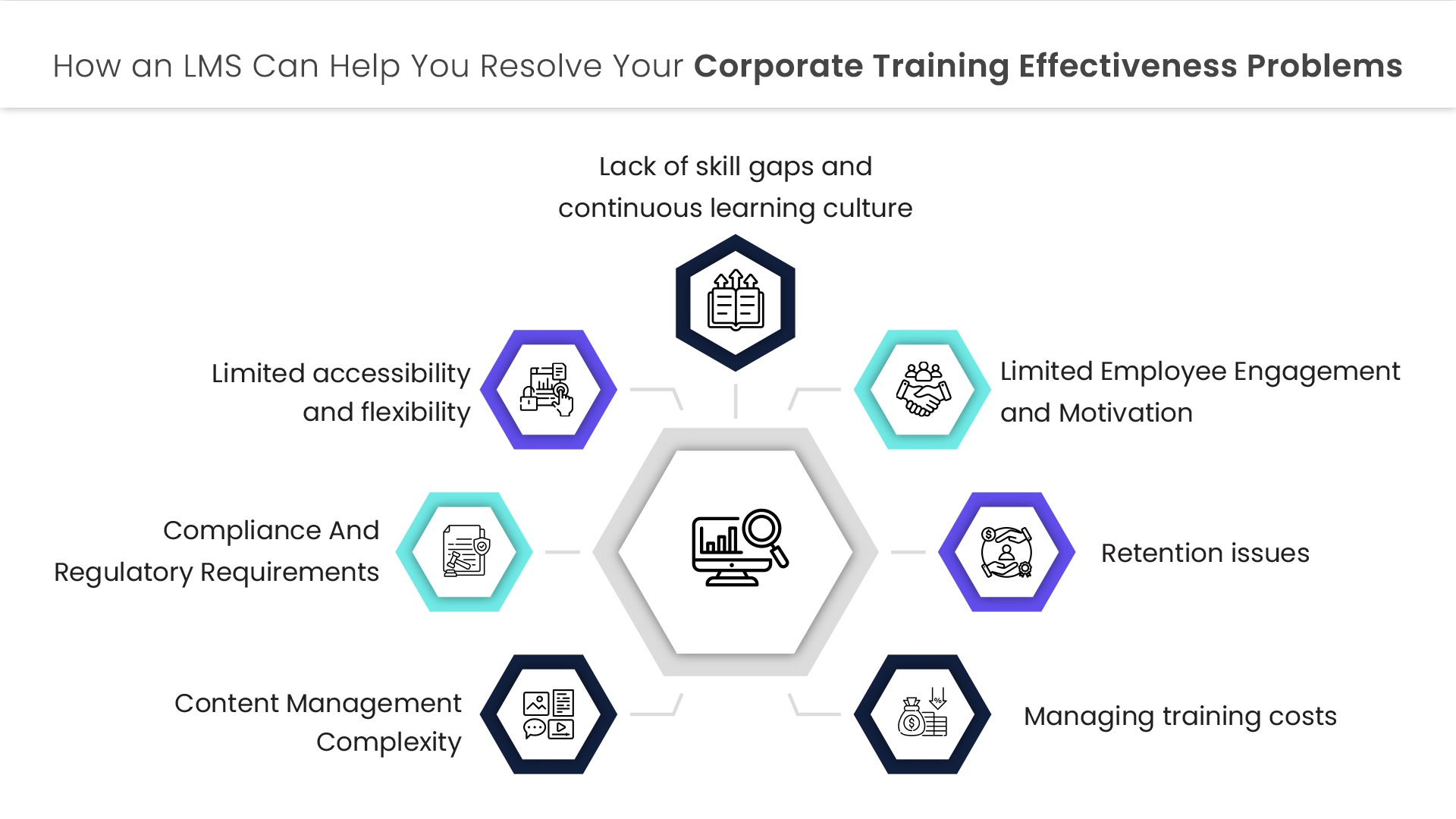Unleashing The Power Of An LMS In Corporate Training
At your business, you might face certain sets of challenges for your corporate training. The more employees you hire, the more effort you need to put into employee training, so that your employees, as well as your organization, can grow. This is where a Learning Management System (LMS), one of the most popular technologies, can help accomplish crucial tasks for your company’s Learning and Development needs. In this article, we’ll explore some of the common hurdles companies face and discuss effective strategies to overcome them using an LMS in corporate training to make it easier, more accessible, and streamlined. Let us begin!
How An LMS Can Help You Resolve Your Corporate Training Effectiveness Problems

Content Management Complexity
- Challenge
Managing and updating training content can be overwhelming, especially as the volume and complexity of content increases over time. Without efficient content management tools, organizing and managing training materials becomes a challenging task for corporate professionals. - Solutions using an LMS
An LMS has a robust content management feature to streamline the creation, organization, and delivery of training content, simplifying content management tasks and improving workflow efficiency. Its collaborative authoring tools empower users to contribute to content creation, fostering a culture of knowledge sharing and collaboration.
Compliance And Regulatory Requirements
- Challenge
Sometimes it can be a daunting task for organizations to keep track of ever-changing compliance and regulatory needs. Failure to adhere to these requirements can result in huge fines and reputational damage. - Solutions using an LMS
An LMS offers a powerful solution for managing compliance training by providing automatic tracking and reporting functionalities. LMSs have a built-in tracking mechanism that helps administrators to monitor their employee's progress in real time and generate comprehensive reports to demonstrate compliance efforts. Further, the LMS can be customized to align with specific industry standards and regulatory requirements ensuring that employees receive up-to-date training on relevant topics by which the organization can avoid costly fines and reputational damage.
Limited Accessibility And Flexibility
- Challenge
In today's digital era, employees expect flexibility and accessibility from their organizations when it comes to learning opportunities. Traditional training methods often fall short of meeting their expectations, leading to disengagement and diminished learning outcomes. - Solutions using an LMS
By leveraging the power of an LMS, employees can learn at their own pace and at their convenience. Whether they are in the office, on the go, or working remotely, employees can access training material through various devices instead of having to sit in a conference room. Furthermore, the LMS can support multimedia content such as videos and other interactive simulations that provides them with a different learning style. This enhances their engagement with training and encourages better knowledge retention.
Lack Of Skills Gaps And A Continuous Learning Culture
- Challenge
As industries evolve and new technologies emerge, employees must continually update their skills to remain competitive in the market. However, identifying and addressing skills gaps within the workforce can be a complex and time-consuming process. - Solutions using an LMS
With an LMS's robust analytics capability, organizations can identify skills gaps and develop targeted training programs. By analyzing employee performance data and feedback, administrators can pinpoint areas of improvement and tailor learning interventions accordingly. Moreover, the LMS may support continuing professional development by offering a wide range of courses and resources to help employees stay ahead of industry trends.
Limited Employee Engagement And Motivation
- Challenge
Engaging employees in corporate training programs can be a significant challenge, especially when faced with competing priorities and distractions. Without employees' active participation, training efforts are likely to fail no matter how much effort and time the organization puts into the training programs. - Solutions using an LMS
An LMS incorporates gamification elements and social learning features to enhance employee engagement and motivation. By using gamification elements such as leaderboards, batches, and rewards, organizations can transform learning into a fun and interactive experience. Furthermore, the LMS facilitates collaboration and knowledge sharing among employees through discussion forms, peer-to-peer learning communities, and virtual classrooms, fostering a culture of continuous learning and growth.
Retention Issues
- Challenge
Frequent turnover can disrupt productivity and strain resources leading to an increase in recruitment and training costs. Plus, retaining top talent is essential for maintaining organizational stability and creating a positive working environment. - Solutions using an LMS
An LMS can play a crucial role in employee retention by offering personalized development opportunities. Through skills assessment and performance tracking, employees can identify areas for growth and progress within the organization. The LMS also indicates the company's dedication to investing in the long-term success of its employees, which boosts job satisfaction and loyalty by offering continual Learning and Development opportunities.
Managing Training Costs
- Challenge
To balance the need for corporate training initiatives with limited budgets can be a challenge for organizations, especially for small businesses. Without carefully planning and making cost-effective solutions training expenses can quickly get out of control. - Solutions using an LMS
An LMS offers cost-creative solutions for managing training costs and maximizing budget resources. By centralizing training materials and delivery mechanisms, organizations can eliminate the need for expensive classroom-based training sessions and printing training materials. Moreover, features like automated enrolment, self-paced learning modules, and reusable content templates can help streamline administrative processes and reduce overhead costs related to training delivery.
By addressing these corporate training challenges, organizations can unlock the full potential of their LMS investment and empower learners to succeed. Organizations may face several daunting challenges when using an LMS, but a well-executed strategy can turn an LMS into a powerful tool for effective training with proper planning and preparation as mentioned above.
Image Credits:
- The image within the body of the article was created/supplied by the author.
Editor's Note: Check out our directory to find, choose, and compare eLearning Industry's Top LMS Software.









